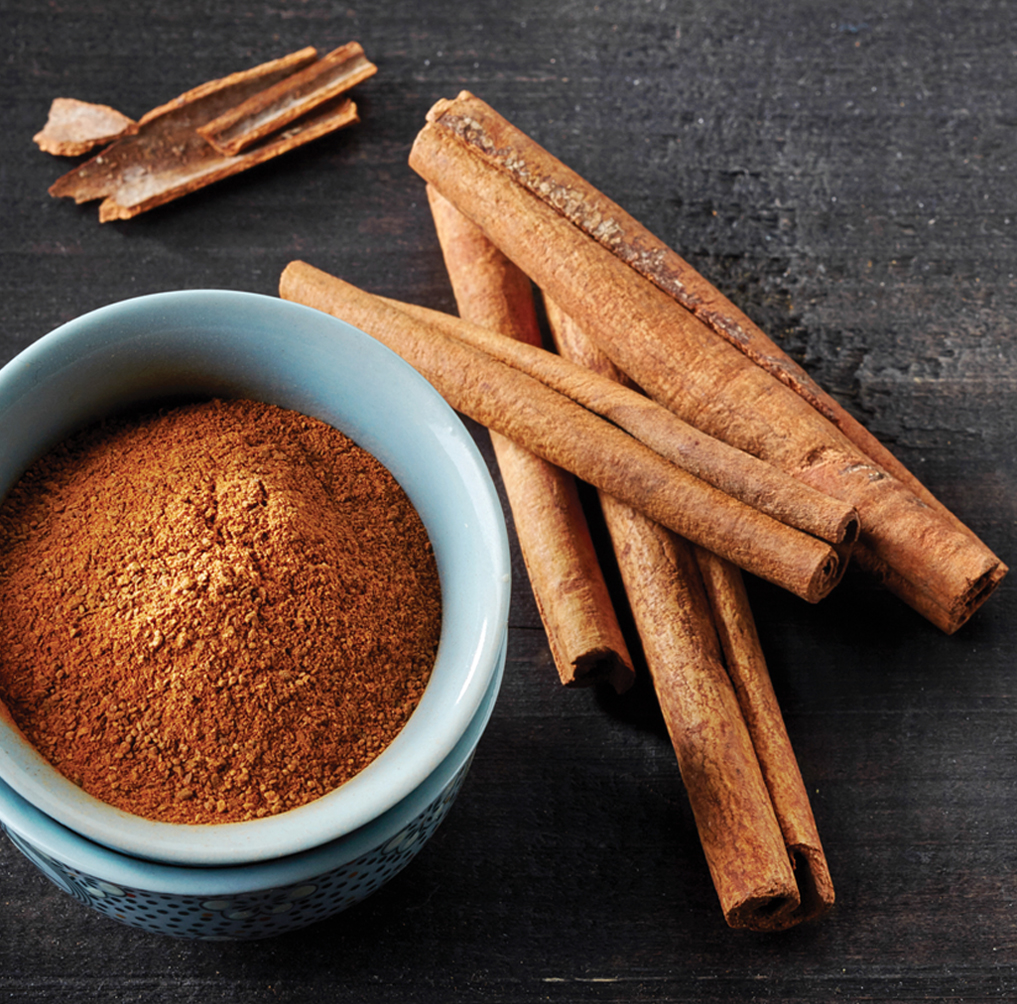A common item found in kitchen pantries, cinnamon is more than just a condiment to spice up your apple pie – it has properties that could boost your health!

Cinnamon trees belong to a large genus of some 250 species, most of which are aromatic. They are native to India, Sri Lanka, Myanmar and Bangladesh.
These days, however, Sri Lanka, China and Indonesia are the leading exporters of this spice: in 2017, these three countries contributed about 70% of the world’s cinnamon supply. The part that we consume comes from the inner bark of the tree.
USES, THEN AND NOW
Cinnamon is used as an aromatic condiment and flavouring additive for sweet treats like breakfast cereals, cinnamon buns and Christmas cookies. It can also be found in savoury dishes like Moroccan meatballs and Indian butter chicken. Cinnamon is also used as a natural preservative to lengthen the shelf life of food products such as bread.
As cinnamon has anti-fungal properties (more on this later), the ancient Egyptians used it to preserve their mummies. Besides using it in embalming potions, they also put extracts of cinnamon in their perfumes, incense and oils. In medieval times, healers used cinnamon in medicines to treat cough, hoarseness, and sore throat. Legend has it that during the Roman Empire, Nero ordered a year’s supply of cinnamon to be placed on the funeral pyre of his second wife.
HEALTH BENEFITS, REDISCOVERED
Despite its popularity as a curative in the past, cinnamon’s role has been reduced to a smell and taste enhancer in modern societies. People however are now rediscovering its health benefits.
According to clinical nutritionist Dr Josh Axe (www.draxe.com), taking half a teaspoon of cinnamon powder daily has positive effects on blood sugar levels, digestion, immunity and more. Stronger doses are also beneficial for cutting the risk of heart disease, diabetes and even cancer.
Before you eagerly jump on this spicy bandwagon, check with your doctor. Cinnamon may not agree with some people due to allergies. The spice may also affect the liver — that is why people taking statins should avoid cinnamon. People on blood thinning medications, too, should not consume cinnamon.
Nonetheless, here are 9 health benefits of cinnamon:
- It is a good source of antioxidants, helping to lower the risk of cancer, like other superfoods
- It contains anti-inflammatory properties, which help with pain management such as relieving muscle soreness, PMS and age-related pains.
- Research also shows that cinnamon helps defend against cognitive decline (Parkinson’s and Alzheimer’s diseases, for example) and aids brain function.
- It protects heart health. Studies have shown that it can help lower cholesterol and blood pressure, thereby reducing the risk of stroke. Cinnamon also increases blood circulation and prevents bleeding by helping blood to clot.
- It helps fight diabetes and lowers blood sugar levels. Many studies have shown that people with type 2 diabetes experience positive effects on their blood sugar levels when they take supplements with cinnamon extract.
- It fights infection, such as colds, and viruses in the digestive tract.
- It freshens the breath naturally by protecting against bacteria that causes tooth decay, bad breath and mouth infections.
- It prevents and cures candida, thanks to its strong anti-fungal properties.
- It benefits the skin – cinnamon’s antibiotic and antimicrobial effects protect skin from irritations, rashes, allergic reaction and infections. Applying cinnamon essential oil directly onto the skin can help alleviate inflammation, swelling, pain and redness.







